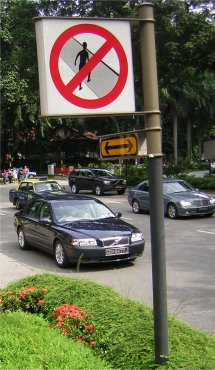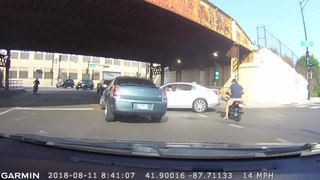Related Research Articles

A summary offence or petty offence is a violation in some common law jurisdictions that can be proceeded against summarily, without the right to a jury trial and/or indictment.

Jaywalking is the act of pedestrians walking in or crossing a roadway if that act contravenes traffic regulations. The term originated in the United States as a derivation of the phrase jay-drivers, people who drove horse-drawn carriages and automobiles on the wrong side of the road, before taking its current meaning. Jaywalking was coined as the automobile arrived in the street in the context of the conflict between pedestrian and automobiles, more specifically the nascent automobile industry.
Vehicular homicide is a crime that involves the death of a person other than the driver as a result of either criminally negligent or murderous operation of a motor vehicle.

Road rage is aggressive or angry behavior exhibited by motorists. These behaviors include rude and verbal insults, yelling, physical threats or dangerous driving methods targeted at other drivers, pedestrians or cyclists in an effort to intimidate or release frustration. Road rage can lead to altercations, damage to property, assaults, and collisions that result in serious physical injuries or even death. Strategies include cutting motorists off, inappropriate honking, using obscene gestures, flipping off another driver, swerving, tailgating, brake checking, and physical confrontation.

A traffic ticket is a notice issued by a law enforcement official to a motorist or other road user, indicating that the user has violated traffic laws. Traffic tickets generally come in two forms, citing a moving violation, such as exceeding the speed limit, or a non-moving violation, such as a parking violation, with the ticket also being referred to as a parking citation, or parking ticket.
A hoon is an Australian and New Zealand term describing a person who deliberately drives a vehicle in a reckless or dangerous manner, generally in order to provoke a reaction from onlookers.
Public intoxication, also known as "drunk and disorderly" and "drunk in public", is a summary offense in some countries rated to public cases or displays of drunkenness. Public intoxication laws vary widely by jurisdiction, but usually require an obvious display of intoxicated incompetence or behavior which disrupts public order before the charge is levied.
Causing death by dangerous driving is a statutory offence in England and Wales, Scotland and Northern Ireland, as well as Hong Kong. It is an aggravated form of dangerous driving. In the UK, it was created by section 1 of the Road Traffic Act 1988, and in Hong Kong it was created by section 36 of the Road Traffic Ordinance.
Many countries have adopted a penalty point or demerit point system under which a person’s driving license is revoked or suspended based on the number of points they’ve accumulated over a specific period of time. Points are given for traffic offenses or infringements committed by them in that period. The demerit points schemes of each jurisdiction varies. These demerit schemes are usually in addition to fines or other penalties which may be imposed for a particular offence or infringement, or after a prescribed number of points have been accumulated.

In United States law, reckless driving is a major moving violation related to aggressive driving that generally consists of driving a vehicle with willful or wanton disregard for the safety of persons or property. It is usually a more serious offense than careless driving, improper driving, or driving without due care and attention, and is often punishable by fines, imprisonment, or the suspension or revocation of one's driver's license. In Commonwealth countries, the offense of dangerous driving applies.

The Road Safety Act 2006 is an Act of the Parliament of the United Kingdom. The provisions contained in the Act are designed to improve road safety and help achieve casualty reduction targets. The Government’s strategy for improving road safety was set out in the framework paper "Tomorrow's Roads – safer for everyone". The aim is to improve road safety and achieve casualty reduction targets of 40% of those killed and seriously injured and 50% reduction for children by 2010.
In India, a driving licence is an official document that authorises its holder to operate various types of motor vehicles on highways and some other roads to which the public has access. In various Indian states, they are administered by the Regional Transport Authorities/Offices (RTA/RTO). A driving licence is required in India by any person driving a vehicle on any highway or other road defined in the Motor Vehicles Act, 1988. This act sets limits on the minimum age for vehicle operation ranging from 16 to 20, depending on specific circumstances. A modern photo of the driving licence can also serve many of the purposes of an identity card in non-driving contexts, such as proof of identity or age.
In United Kingdom law, dangerous driving is a statutory offence related to aggressive driving. It is also a term of art used in the definition of the offence of causing death by dangerous driving. It replaces the former offence of reckless driving. Canada's Criminal Code has equivalent provisions covering dangerous driving.
In Canada, impaired driving is the criminal offence of operating a motor vehicle while the person's ability to operate the vehicle is impaired by alcohol or a drug. The offence includes having care or control of a motor vehicle while the person's ability to operate the motor vehicle is impaired by alcohol or a drug. Impaired driving is punishable under multiple offences in the Criminal Code, with greater penalties depending on the harm caused by the impaired driving. It can also result in various types of driver's licence suspensions.
The laws of driving under the influence vary between countries. One difference is the acceptable limit of blood alcohol content before a person is charged with a crime. Thresholds range from the limit of detection (zero-tolerance) to 0.08%. Some countries have no limits or laws on blood alcohol content.

In traffic laws, a hit and run or a hit-and-run is the criminal act of causing a traffic collision and not stopping afterwards. It is considered a supplemental crime in most jurisdictions.
Causing bodily harm by wanton or furious driving is a statutory offence in England and Wales and Northern Ireland. It has been abolished in the Republic of Ireland.
A penalty points system has been in operation since 2002 for regulatory offences relating to driving licences in the Republic of Ireland. More serious driving offences are not included in the penalty points system but result in automatic driving bans or imprisonment. After controversy about alleged flaws in the implementation, an Independent Oversight Authority was established in 2015 to make annual reports on its operation.
Remedies for copyright infringement in the United States can be either civil or criminal in nature. Criminal remedies for copyright infringement prevent the unauthorized use of copyrighted works by defining certain violations of copyright to be criminal wrongs which are liable to be prosecuted and punished by the state. Unlike civil remedies, which are obtained through private civil actions initiated by the owner of the copyright, criminal remedies are secured by the state which prosecutes the infringing individual or organisation.
References
- ↑ "Understanding demerit points | ontario.ca".
- ↑ "Penalty points (endorsements): Removing expired endorsements from your driving record". GOV.UK. Accessed 25 July 2020.
- ↑ "Careless Driving / Driving Without Due Care and Attention". motorlawyers.co.uk. Retrieved 5 January 2012.
- ↑ "Driving without due care and attention - our guide to staying safe". Royal Automobile Club. 23 January 2018. Retrieved 25 July 2020.
- ↑ "Close pass cycling". West Midlands Police. Archived from the original on 25 July 2020. Retrieved 25 July 2020.
- ↑ Arthurs-Brennan, Michelle (October 28, 2019). "Dangerous driving conviction upheld for close pass despite appeal". Cycling Weekly. Retrieved 25 July 2020.
- ↑ "Careless Driving Under the Highway Traffic Act". OTD Legal. Retrieved 2 July 2024.